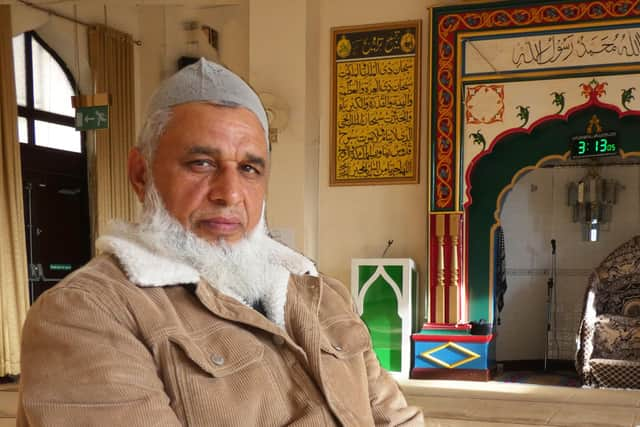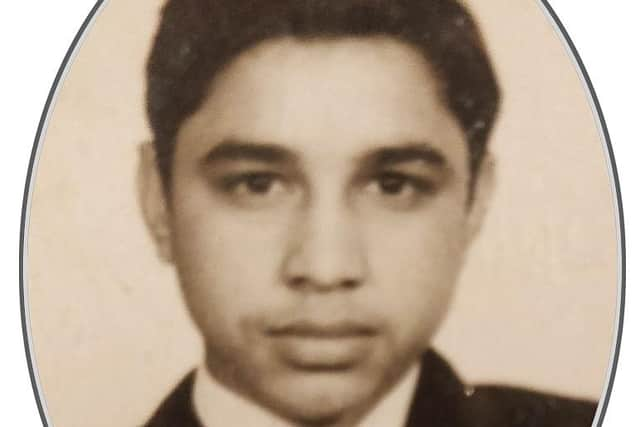Ravensthorpe Stories In A Suitcase: Mr. Ali describes the ‘harsh’ british weather faced by his generation
and live on Freeview channel 276
He was part of a large group of Indian and Pakistani nationals who were encouraged to come and work in our local mills throughout the post-war decades of the 1960's and 1970's.
These men came to Britain because of a severe labour shortage existing during that period across the whole country.
Advertisement
Hide AdAdvertisement
Hide AdAs someone who now belongs to a dwindling generation, Mr. Ali agreed to be interviewed for the Kirklees Faith Network's ‘Ravensthorpe Stories In A Suitcase Project’.


He talks in this second feature about the ‘harsh’ british weather he faced during his school years.
Speaking to the Reporter Series, Mr Ali said: "I came to Dewsbury in October 1967. But I was too young to work in the mills. I had to stay at home until a school place was allocated for me.
“The time period was well over six months, or perhaps maybe a year, before the bureaucracy got sorted - and the education authority eventually found a place.
Advertisement
Hide AdAdvertisement
Hide Ad"My father quickly realised the school's location was on Beckett Street in Batley Carr. It was a rather long distance from our flat on Wakefield Road.


“Other than my very first day when he decided to take me himself, I always walked alone to school in knee-deep snow. I can remember the big white snowflakes falling everywhere on the roads and pavements - as well as on my hooded anorak coat.
“Strong gusts of icy cold wind blew the equally wet freezing snow in my face. Even the anorak's hood was not firm enough to cover my head or to protect me from the elements.
"Despite wearing the school uniform and woolly socks, my hands and feet would be cold and numb, and I often entered the classroom shivering from head to foot. That was the hardship and the wintery weather seen by my generation.
Advertisement
Hide AdAdvertisement
Hide Ad“I feel very surprised now at how everything comes to a standstill even if there is a light snow shower for just a few hours!
"But the schools, the shops, and the mills stayed open in my day. The only time we were sent home from our classes was when the boiler broke down. Otherwise, everything went on as normal.
“These snowfalls were a daily part of people’s lives during that post-war era.
"Although I had suffered from severe travel sickness on my first journey to England, I can still remember the actual arrival date of October 18, 1967, when our flight landed at Heathrow Airport.
Advertisement
Hide AdAdvertisement
Hide Ad“My father and I had then boarded a coach heading towards Dewsbury on a partially ready M1. We saw some huge frightening snowy blizzards on the motorway. It did not happen to be long before I was to see more heavy snowfalls along with thick mist over the coming days and months.
"I came to Dewsbury in October 1967. But it was five months later in March 1968 when I saw the first rays of sunlight! So I was already used to living with the depressing harsh weather ever since arriving in the country.
"I was rather surprised on my first day at ‘school’ to see lots of other Pakistani and Gujarati-speaking Indian children. There were no white-English faces in any of the school’s four classrooms!
"But within a few days, I found out the building on Beckett Street was actually the 'Dewsbury and Batley Immigrant Centre'. Children like me who did not speak English were sent there to be taught the basics - starting with the alphabet.
Advertisement
Hide AdAdvertisement
Hide Ad“I settled down to learn English, and I made new friends. Besides the snowfalls, I felt relieved to be outside after all those dreadful lonely months stuck in the house waiting for a school place.
“I had to walk home every day after school. I sometimes had a few pennies in my pocket to buy a small packet of crisps on the way from one of the corner shops. But the kids from my generation never had an opportunity to enjoy the hot teatime pizzas, the milkshakes, the donner kebab burgers, the mouthwatering fish-fillets, or the tasty Samosas. Unlike these days, there were no Indian take-aways or dessert parlours for us to walk into after school.
“Anyone wanting a Samosa had to get on a number 268 double-decker bus to Bradford’s famous 'Sweet Centre' in Manningham district. There was no other restaurant across the West Ridings Borough making Samosas in that era!
"My father would still be at work when I came home from school. So the atmosphere was not like the average family household. I had no loving mother to open the front door. She was still in Pakistan. No warm gas fire was burning, and condensation dripped from the thin single glass windows. The whole dark flat had a dull lino on the ground instead of a carpet, making our indoors just as cold as the outside.
Advertisement
Hide AdAdvertisement
Hide Ad"Housing for most working class people was squalid in that era anyway - and the flat where I first came to live in had damp. It was not a cheerful place to grow up in as a child. Yet, this is how the children of my generation lived during those tough post-war years."